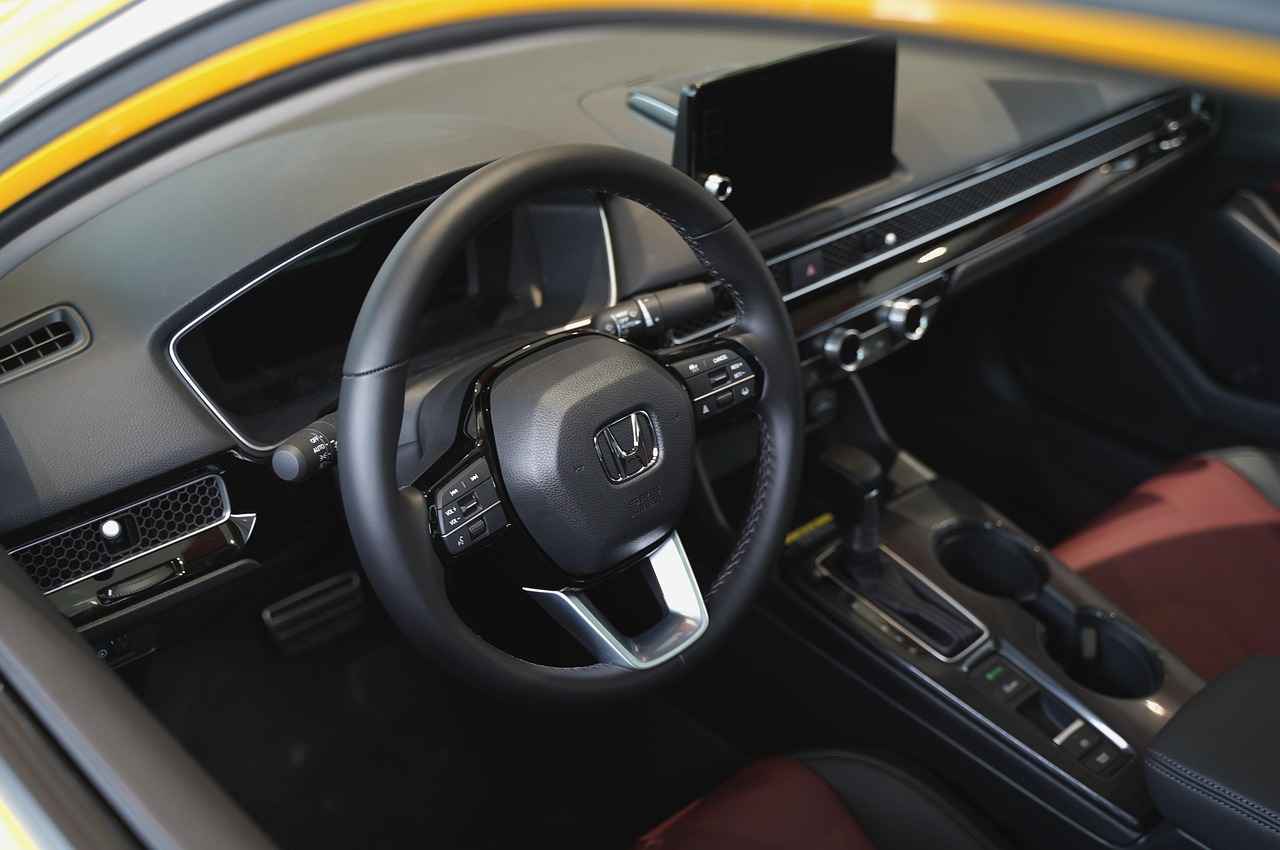In this article, we will explore the reliability of Honda Accords, examining performance metrics, owner experiences, and expert opinions to provide a comprehensive overview of this popular vehicle model.
What Makes Honda Accords Stand Out?
Honda Accords are renowned for their durability and performance. One of the key features contributing to their reliability is the engine efficiency. The Accords are equipped with advanced engineering that not only enhances fuel economy but also reduces wear and tear on components.
- Quality Build: The materials used in the construction of Honda Accords are designed to withstand the test of time.
- Advanced Safety Features: With multiple safety ratings, Honda Accords are built with the latest technologies to protect passengers.
- Comfortable Interior: The spacious and well-designed interior makes long drives more enjoyable, further enhancing the ownership experience.
How Do Honda Accords Compare to Competitors?
When assessing reliability, it’s crucial to compare Honda Accords with rival models. In this section, we will analyze how they stack up against competitors like Toyota Camry and Nissan Altima in reliability ratings.
| Model | Reliability Rating | Owner Satisfaction |
|---|---|---|
| Honda Accord | 9/10 | High |
| Toyota Camry | 8/10 | Moderate |
| Nissan Altima | 7/10 | Moderate |
Reliability Ratings from Industry Experts
Various organizations provide reliability ratings for vehicles. The Honda Accord consistently receives high marks from sources like J.D. Power and Consumer Reports, focusing on its performance over the years.
Consumer Reports Insights
Consumer Reports offers valuable insights into vehicle reliability. Their findings on Honda Accord reveal a strong correlation between owner satisfaction and long-term performance.
Owner Experiences with Honda Accords
Real-world experiences provide a unique perspective on reliability. Testimonials from Honda Accord owners often highlight both common issues and praises, giving potential buyers a well-rounded view.
- Positive Feedback: Many owners report low maintenance costs and high resale value.
- Common Complaints: Some have mentioned minor electrical issues, but these are generally infrequent.
What Common Issues Do Honda Accords Face?
While generally reliable, Honda Accords are not without their problems. The most commonly reported issues include:
- Mechanical Problems: Some owners have reported issues with the transmission, particularly in older models.
- Electrical System Concerns: A few have experienced electrical glitches, though these are typically manageable.
What Maintenance Practices Enhance Reliability?
Regular maintenance is key to vehicle longevity. Essential practices include:
- Routine Service Recommendations: Following a service schedule is vital for maintaining reliability.
- DIY Maintenance Tips: Many owners prefer to handle minor tasks themselves, such as oil changes and tire rotations.
How Do Honda Accords Perform in Crash Tests?
Safety is a critical factor in reliability. The Honda Accord has performed exceptionally well in crash tests, receiving high marks from both the IIHS and NHTSA.
What Do Experts Say About Honda Accord’s Longevity?
Expert analysis suggests that Honda Accords are built to last, with many models reaching over 200,000 miles with proper care.
- Longevity Studies: Studies show that Honda Accords often outlast many competitors in their class.
- Expert Recommendations: Potential buyers are encouraged to consider Honda Accords for their reliability and performance metrics.

What Makes Honda Accords Stand Out?
The Honda Accord has long been a favorite among car enthusiasts and everyday drivers alike. Known for its exceptional blend of durability and performance, the Accord stands out in the crowded midsize sedan market. This article will explore the features that contribute to the Honda Accord’s reputation as a reliable choice for consumers seeking a dependable vehicle.
One of the most compelling attributes of the Honda Accord is its engine performance. With options ranging from fuel-efficient four-cylinder engines to powerful V6 variants, the Accord caters to a wide array of driving preferences. The smooth acceleration and responsive handling make it a joy to drive, whether on city streets or open highways. Furthermore, Honda’s engineering excellence ensures that these engines are not only powerful but also fuel-efficient, making the Accord an economical choice for long-term ownership.
Another factor that enhances the Accord’s appeal is its build quality. Honda has a reputation for manufacturing vehicles that can withstand the test of time, and the Accord is no exception. High-quality materials and meticulous craftsmanship contribute to a solid and reliable structure. Owners often report minimal wear and tear even after several years of use, reinforcing the Accord’s status as a long-lasting vehicle.
In terms of safety features, the Honda Accord excels with a comprehensive suite of advanced technologies. Standard features often include adaptive cruise control, lane-keeping assist, and collision mitigation braking systems. These innovations not only enhance driver confidence but also contribute to the vehicle’s high safety ratings. Organizations like the Insurance Institute for Highway Safety (IIHS) consistently recognize the Accord for its impressive safety performance, further solidifying its reputation as a reliable family sedan.
Moreover, the Honda Accord is equipped with an array of technology features that cater to modern drivers. The infotainment system is user-friendly, offering seamless smartphone integration through Apple CarPlay and Android Auto. The availability of premium audio systems and navigation options enhances the overall driving experience, making long trips more enjoyable.
Another significant aspect of the Honda Accord is its resale value. Honda vehicles are known to retain their value better than many competitors, and the Accord is a prime example. Its reputation for reliability and low maintenance costs makes it a sought-after option in the used car market. This aspect is particularly appealing for buyers who consider long-term investment in their vehicle.
Lastly, the Honda Accord boasts a spacious and comfortable interior. With ample legroom and cargo space, it meets the needs of families and individuals alike. The thoughtful design and high-quality materials used throughout the cabin create an inviting atmosphere, making it a pleasant environment for both drivers and passengers.
In summary, the Honda Accord stands out due to its combination of engine performance, build quality, safety features, technology, resale value, and interior comfort. These attributes not only contribute to its reputation as a reliable midsize sedan but also make it a compelling choice for a wide range of consumers. Whether you prioritize performance, safety, or comfort, the Honda Accord delivers on all fronts, ensuring that it remains a top contender in its class.

How Do Honda Accords Compare to Competitors?
When evaluating the reliability of midsize sedans, the Honda Accord frequently emerges as a top contender. However, to truly understand its standing, it is essential to compare it with its primary competitors, such as the Toyota Camry and Nissan Altima. This analysis will delve into the reliability ratings of these models, highlighting key differences and similarities that can influence consumer choice.
The Toyota Camry has long been known for its reliability, often competing neck-and-neck with the Honda Accord. According to Consumer Reports, both vehicles consistently rank high in reliability surveys. In their latest evaluations, the Accord scored slightly higher in owner satisfaction, while the Camry excelled in long-term reliability metrics. This indicates that while both cars are dependable, the Accord may offer a more engaging driving experience, which can be a deciding factor for many buyers.
On the other hand, the Nissan Altima presents a different reliability profile. While it offers a comfortable ride and a suite of modern technology, its reliability ratings often lag behind those of the Accord and Camry. According to J.D. Power, the Altima has faced more frequent issues, particularly in the areas of engine performance and electrical systems. This can be a significant consideration for potential buyers prioritizing long-term reliability.
- Honda Accord: Owners frequently report high satisfaction levels, citing its smooth ride and low maintenance costs.
- Toyota Camry: Many appreciate its fuel efficiency and robust resale value, although some note that its driving dynamics can feel less spirited compared to the Accord.
- Nissan Altima: While some owners enjoy its stylish design and tech features, others express concerns over reliability, particularly with older models.
Experts from J.D. Power and Consumer Reports emphasize the importance of reliability ratings in their assessments. The Honda Accord often leads in categories such as customer satisfaction and overall dependability. In contrast, while the Camry is praised for its longevity, the Altima’s ratings suggest a need for improvement in certain mechanical areas.
In summary, when comparing the Honda Accord to its competitors, it becomes clear that while the Accord stands out for its overall reliability and owner satisfaction, the Toyota Camry also holds its ground with solid long-term performance. The Nissan Altima, while stylish and packed with features, may not match the reliability of its counterparts. Therefore, prospective buyers should weigh these factors carefully to make an informed decision that aligns with their expectations for reliability and performance.
Reliability Ratings from Industry Experts
When it comes to assessing the reliability of vehicles, industry experts play a crucial role in providing valuable insights. Various organizations, including J.D. Power and Consumer Reports, have dedicated their efforts to evaluating and rating vehicles based on their performance, owner satisfaction, and long-term durability. This section will explore the reliability ratings of the Honda Accord, a model that has garnered a reputation for its dependability over the years.
J.D. Power is renowned for its comprehensive surveys and ratings that reflect consumer experiences. In their annual Vehicle Dependability Study, the Honda Accord consistently ranks among the top vehicles in its class. In recent years, it has received high scores in areas such as quality, reliability, and customer satisfaction. For instance, the 2022 model year saw the Accord earning the title of the Best Midsize Car in the J.D. Power rankings, highlighting its strong performance in reliability metrics.
Consumer Reports is another authoritative source when it comes to vehicle reliability. Their ratings are based on extensive surveys from real owners, providing a unique perspective on long-term performance. The Honda Accord has frequently been featured in their Top Picks list, often praised for its fuel efficiency, comfortable ride, and low maintenance costs. In their latest report, the Accord received a reliability score of 85 out of 100, indicating a strong level of owner satisfaction and durability.
To truly understand the reliability of the Honda Accord, it is essential to compare it against its competitors, such as the Toyota Camry and Nissan Altima. In several reliability studies, the Accord has outperformed these rivals, particularly in terms of fewer reported problems and higher owner satisfaction ratings. For example, while the Camry also enjoys a solid reputation, the Accord has been noted for its superior interior quality and driving dynamics, which contribute to its overall reliability.
When examining the long-term reliability of the Honda Accord, it is essential to look at data spanning multiple years. According to various studies, many Honda Accord models have been known to reach 200,000 miles or more with proper maintenance. This durability is often attributed to Honda’s engineering excellence and commitment to quality. Owners frequently report that their Accords maintain performance and efficiency well into their later years, further solidifying the model’s reputation.
Owner experiences provide invaluable insights into the reliability of the Honda Accord. Numerous testimonials highlight the model’s low incidence of mechanical issues and the overall satisfaction of drivers. Many owners express that their Accords have required minimal repairs and have been dependable vehicles for daily commuting and long trips alike. This positive feedback is a testament to the vehicle’s reliability and the brand’s commitment to quality.
In summary, the Honda Accord continues to receive high praise from both industry experts and owners alike. Its consistent performance in reliability ratings from J.D. Power and Consumer Reports, combined with positive owner experiences, positions the Accord as a trusted choice for those seeking a dependable midsize sedan. Whether it’s for daily commuting or family road trips, the Honda Accord proves to be a reliable vehicle that stands the test of time.
Consumer Reports Insights
Consumer Reports has long been a trusted authority in evaluating vehicle reliability, and their findings on the Honda Accord are particularly noteworthy. This midsize sedan has consistently garnered high marks from both owners and experts, reflecting its reputation for durability and long-term performance. In this section, we will summarize key insights from Consumer Reports regarding the Honda Accord, focusing on owner satisfaction and reliability.
According to Consumer Reports, the Honda Accord stands out in several key areas that contribute to its reliability. The organization conducts extensive surveys and analyses to assess vehicle performance, and the Accord frequently ranks among the top choices in its class. Here are some of the critical findings:
- High Owner Satisfaction: The Honda Accord has received positive feedback from owners, with many praising its comfort, fuel efficiency, and overall performance.
- Longevity: Consumer Reports notes that the Honda Accord often lasts well beyond 200,000 miles with proper maintenance, making it a wise investment for long-term ownership.
- Low Frequency of Repairs: The data indicates that Honda Accord owners report fewer issues compared to other vehicles in the same category, further enhancing its reliability profile.
Consumer Reports utilizes a comprehensive approach to gauge owner satisfaction. Through surveys, they gather feedback on various aspects of vehicle ownership, including:
- Driving Experience: Owners frequently highlight the Accord’s smooth ride and responsive handling.
- Interior Quality: The quality of materials and design in the Accord’s interior often receives high marks, contributing to a pleasant driving environment.
- Technology Features: Modern Honda Accords are equipped with advanced technology, which owners appreciate for enhancing convenience and safety.
The long-term performance of the Honda Accord is another area where Consumer Reports shines a spotlight. Their analysis reveals:
- Reliability Ratings: The Accord consistently scores high on reliability ratings, often outperforming competitors like the Toyota Camry and Nissan Altima.
- Resale Value: The Honda Accord tends to retain its value well, making it a smart choice for those considering resale options in the future.
- Safety Ratings: Consumer Reports also emphasizes the Accord’s strong safety ratings, which contribute to overall owner confidence in the vehicle.
While the Honda Accord is lauded for its reliability, some owners have reported occasional concerns. Consumer Reports highlights these issues, which include:
- Transmission Problems: A small number of owners have experienced transmission issues, particularly in older models.
- Electrical System Glitches: Some reports indicate minor electrical problems, but these are generally infrequent and manageable.
In summary, the insights provided by Consumer Reports reveal that the Honda Accord is a reliable choice for those in the market for a midsize sedan. With high owner satisfaction, strong long-term performance metrics, and a solid reputation for safety, the Accord remains a top contender in its segment. For prospective buyers, understanding these insights can help make an informed decision about their next vehicle purchase.
J.D. Power Rankings
J.D. Power’s rankings serve as a crucial benchmark in the automotive sector, influencing consumer decisions and manufacturer strategies alike. In this section, we will delve into the performance of the Honda Accord in terms of reliability and customer satisfaction, comparing it with other sedans in the market.
The Honda Accord has consistently received high marks for reliability from J.D. Power. In recent years, it has often been positioned among the top contenders in the midsize sedan category. This reputation is not just based on anecdotal evidence; it is reinforced by data collected from thousands of vehicle owners.
According to J.D. Power’s 2023 Vehicle Dependability Study, the Honda Accord ranks impressively in customer satisfaction. Many owners report that they appreciate the comfort, performance, and fuel efficiency of their vehicles. This satisfaction is a key indicator of reliability, as happy customers are less likely to experience issues with their vehicles.
When comparing the Honda Accord to competitors like the Toyota Camry and Nissan Altima, it becomes evident that the Accord holds its own. In the same J.D. Power study, the Accord outperformed many of its rivals in both initial quality and long-term dependability. This consistent performance across various metrics highlights the Accord’s strong position in the market.
- Build Quality: The materials and craftsmanship of the Honda Accord contribute significantly to its durability.
- Engine Performance: The efficient engines are designed to minimize wear and tear, enhancing reliability.
- Technology and Features: Advanced safety features and user-friendly technology add to the overall satisfaction of Honda Accord owners.
Many Honda Accord owners have shared their experiences through J.D. Power surveys, which provide valuable insights into the vehicle’s reliability. For instance, numerous owners have praised the Accord for its longevity and low maintenance costs. These testimonials often highlight how the vehicle remains trouble-free even after several years of use.
In summary, the Honda Accord’s impressive rankings in J.D. Power’s studies underscore its reputation as a reliable and satisfying choice among midsize sedans. With a focus on quality, performance, and customer satisfaction, the Accord continues to be a top pick for those seeking a dependable vehicle.
Owner Experiences with Honda Accords
When it comes to understanding the reliability of Honda Accords, there’s no better resource than the voices of actual owners. Their experiences provide invaluable insights into the day-to-day performance of this popular vehicle. In this section, we will share testimonials and reviews from Honda Accord owners, highlighting both common issues and praises that can help prospective buyers make informed decisions.
Many Honda Accord owners express a deep appreciation for their vehicles, often citing several key factors:
- Longevity: Numerous owners report driving their Accords well beyond 200,000 miles with minimal issues. This durability is frequently mentioned in reviews.
- Fuel Efficiency: Many owners praise the Accord for its impressive fuel economy, making it an economical choice for daily commuting.
- Comfort and Space: Owners often highlight the spacious interior and comfortable seating, making long drives enjoyable.
- Resale Value: Honda Accords tend to retain their value well, which is a significant advantage for owners planning to sell or trade in their vehicles.
While the Honda Accord is generally regarded as a reliable vehicle, some owners have reported issues that potential buyers should be aware of:
- Transmission Problems: A number of owners have experienced issues with the automatic transmission, particularly in older models. These problems can lead to costly repairs.
- Brake Wear: Some drivers have noted that the brakes may wear out faster than expected, which can affect safety and performance.
- Electrical Issues: Reports of electrical system malfunctions, such as problems with the infotainment system or dashboard lights, have been mentioned by several owners.
To provide a clearer picture, here are some real testimonials from Honda Accord owners:
"I bought my 2015 Honda Accord used and have had it for three years. It has been incredibly reliable, with only routine maintenance needed. I love how spacious it is for my family!" - Sarah M."My 2008 Accord has over 250,000 miles on it, and it still runs like a champ! The only major repair I've had to do was replacing the alternator." - John D."I had to replace my brakes sooner than I expected, which was a bit disappointing. However, overall, I still love my Accord and would recommend it to anyone." - Emily R.
Experts often emphasize that owner experiences are crucial in assessing a vehicle’s reliability. They note that Honda Accords consistently receive high marks for owner satisfaction, particularly regarding their performance and durability. The collective feedback from owners often aligns with industry reliability ratings, reinforcing the Accord’s reputation as a dependable vehicle.
In summary, owner experiences with Honda Accords reveal a mix of appreciation for the vehicle’s long-term reliability and some common issues that may arise. While many drivers enjoy the benefits of owning an Accord, potential buyers should be aware of the reported problems to make a fully informed decision.

What Common Issues Do Honda Accords Face?
When considering the reliability of the Honda Accord, it is essential to acknowledge that, while these vehicles are generally dependable, they are not completely free from issues. In this section, we will explore the most commonly reported problems faced by Honda Accord owners, how these issues impact overall reliability, and what potential buyers should be aware of.
Honda Accords are widely praised for their durability and performance. However, like any vehicle, they can experience specific problems that may affect their reliability. Below are some of the most frequently reported issues:
- Transmission Problems: Some owners have reported issues with the transmission, particularly in older models. These problems can manifest as slipping gears or delayed shifting, which can lead to costly repairs if not addressed promptly.
- Brake Wear: Another common complaint among Honda Accord owners is premature brake wear. While brake pads and rotors will inevitably wear out over time, some drivers have found that they need to replace them more frequently than expected, impacting the overall cost of ownership.
- Electrical System Issues: Electrical problems can arise in various forms, such as malfunctioning dashboard lights, issues with the power windows, or problems with the audio system. These issues can often be frustrating and may require professional diagnosis to resolve.
- Suspension Concerns: A few owners have reported problems with the suspension system, including noise when going over bumps or a rough ride. These issues can affect the driving experience and may require repairs to ensure safe handling.
Understanding these common issues can help prospective buyers make informed decisions. It’s important to note that while these problems have been reported, they do not affect every Honda Accord, and many owners enjoy trouble-free experiences.
The issues mentioned above can impact the perceived reliability of the Honda Accord. For instance, if a vehicle frequently requires repairs or experiences significant downtime, it can lead to frustration among owners and potentially lower resale value. However, many Honda Accord owners report high satisfaction levels despite these occasional problems, often citing the vehicle’s overall performance, fuel efficiency, and comfort as significant advantages.
Moreover, regular maintenance and timely repairs can significantly mitigate the impact of these issues. Owners who adhere to recommended service schedules and address problems as they arise often find that their Honda Accords remain reliable for many years.
To enhance the reliability of a Honda Accord, owners should consider the following maintenance practices:
- Regular Inspections: Conducting routine checks on the vehicle’s systems can help identify potential problems before they escalate.
- Prompt Repairs: Addressing any issues immediately can prevent further damage and maintain the vehicle’s reliability.
- Quality Parts: When replacing parts, using high-quality or OEM components can ensure better performance and longevity.
By being proactive and informed, Honda Accord owners can enjoy the many benefits of their vehicles while minimizing the impact of common issues.
Mechanical Problems Reported
The reliability of the Honda Accord has made it a popular choice among car buyers, but like any vehicle, it is not without its issues. Among the concerns raised by some owners are various mechanical problems that can affect performance and dependability. Understanding these issues can help potential buyers make informed decisions and current owners address any concerns they might face.
Over the years, Honda Accord owners have reported a range of mechanical problems. While these issues may not affect every vehicle, they do appear frequently enough to warrant attention. Here are some of the most commonly reported mechanical problems:
- Transmission Problems: Some owners have experienced issues with the transmission, particularly with slipping or rough shifting. These problems can lead to costly repairs if not addressed promptly.
- Engine Issues: A number of owners have reported engine-related problems, such as excessive oil consumption and engine stalling. These issues can significantly impact the vehicle’s reliability and performance.
- Suspension Complaints: Problems with the suspension system, including premature wear of components like struts and shocks, have also been noted. This can lead to a less comfortable ride and handling issues.
- Brake System Failures: Some drivers have reported issues with the braking system, including premature wear of brake pads and rotors, which can compromise safety.
While the Honda Accord is generally regarded as a reliable vehicle, the frequency of these reported mechanical issues varies by model year and specific trim. According to data from various automotive reliability surveys, certain model years have shown higher incidences of these problems compared to others. For instance, models produced in specific years may have had manufacturing defects that led to increased complaints.
It is essential for prospective buyers to research the specific model year they are considering and check for any recalls or common issues associated with that year. Resources such as Consumer Reports and J.D. Power provide valuable insights into the reliability of different Honda Accord models, allowing buyers to make informed decisions.
Despite the reported mechanical issues, many Honda Accord owners still praise the vehicle for its overall reliability and longevity. Regular maintenance and timely repairs can mitigate many of the concerns raised by owners. Adhering to the manufacturer’s maintenance schedule and addressing issues as they arise can help maintain the vehicle’s performance and reliability.
In conclusion, while some Honda Accord owners have reported mechanical problems, understanding these issues and their frequency can help current and prospective owners navigate potential reliability concerns. By staying informed and proactive about maintenance, owners can continue to enjoy the many benefits that the Honda Accord has to offer.
Electrical System Concerns
Electrical issues can significantly impact the overall performance and reliability of vehicles, including the popular Honda Accord. As a midsize sedan renowned for its durability, the Accord has garnered a loyal following. However, like any vehicle, it is not immune to problems, particularly in its electrical system. This section will delve into the common electrical issues reported by Honda Accord owners and their implications for the vehicle’s reliability.
Honda Accord owners have reported a variety of electrical issues, which can range from minor inconveniences to significant malfunctions. Some of the most frequently noted problems include:
- Battery Drain: Many Accord owners have experienced unexpected battery drain, often attributed to faulty wiring or parasitic draws from electronic components.
- Malfunctioning Power Windows: Issues with power windows not operating correctly can arise from faulty switches or wiring problems, leading to frustration for drivers.
- Dashboard Warning Lights: Some drivers report persistent warning lights on the dashboard that do not indicate any actual issues, often due to sensor malfunctions.
- Lighting Problems: Flickering headlights or malfunctioning interior lights can be indicative of underlying electrical issues, such as bad connections or failing bulbs.
The reliability of a vehicle is often judged by its ability to operate without frequent repairs or malfunctions. Electrical problems in Honda Accords can lead to:
- Increased Repair Costs: Electrical repairs can be more complex and costly compared to mechanical issues. Owners may find themselves facing higher bills if these problems are not addressed promptly.
- Safety Concerns: Malfunctioning electrical components, such as headlights or brake lights, can pose safety risks on the road, potentially leading to accidents.
- Inconvenience: Electrical issues can lead to unexpected breakdowns, leaving drivers stranded or unable to use their vehicles effectively.
To mitigate potential electrical issues, Honda Accord owners should consider the following maintenance practices:
- Regular Battery Checks: Ensuring that the battery is in good condition and connections are secure can prevent unexpected battery drain.
- Inspecting Wiring and Connectors: Periodically checking for signs of wear or corrosion in electrical wiring and connectors can help identify issues before they escalate.
- Addressing Warning Lights Promptly: Ignoring dashboard warning lights can lead to more significant problems. Owners should consult a professional to diagnose and resolve these issues as soon as they arise.
In conclusion, while Honda Accords are generally reliable vehicles, electrical issues can pose challenges that affect their performance and owner satisfaction. By staying informed about common problems and adhering to regular maintenance practices, owners can enhance the longevity and reliability of their vehicles.

What Maintenance Practices Enhance Reliability?
Regular maintenance is essential for ensuring the longevity and reliability of your Honda Accord. By adhering to a consistent maintenance schedule and addressing issues promptly, you can significantly enhance the performance and lifespan of your vehicle. Below, we will explore key maintenance practices that every Honda Accord owner should consider.
- Regular Oil Changes: One of the most critical aspects of vehicle maintenance is changing the oil. For Honda Accords, it is recommended to change the oil every 5,000 to 7,500 miles, depending on driving conditions. Fresh oil helps keep the engine running smoothly and prevents wear and tear.
- Brake System Inspections: Your safety is paramount, and a well-maintained brake system is crucial. Regularly inspect brake pads, rotors, and fluid levels. Replace worn components to ensure optimal braking performance.
- Tire Maintenance: Proper tire care extends their life and enhances fuel efficiency. Check tire pressure monthly and rotate your tires every 5,000 to 7,500 miles. This practice promotes even wear and improves handling.
- Fluid Checks: Regularly inspect and top off essential fluids, including coolant, transmission fluid, and brake fluid. Maintaining proper fluid levels prevents overheating and ensures the smooth operation of various vehicle systems.
- Battery Maintenance: A reliable battery is essential for starting your Honda Accord. Inspect battery terminals for corrosion and ensure a secure connection. Consider replacing the battery every 3 to 5 years to avoid unexpected failures.
Routine Service Recommendations
Following a routine service schedule is vital for maintaining the reliability of your Honda Accord. Refer to the owner’s manual for specific service intervals, but generally, you should adhere to the following:
- Every 30,000 miles: Replace the air filter and fuel filter.
- Every 60,000 miles: Inspect the timing belt and consider replacement if necessary.
- Every 100,000 miles: Replace the spark plugs and inspect other major components.
DIY Maintenance Tips
Many Honda Accord owners prefer to handle minor maintenance tasks themselves to save on costs and gain a better understanding of their vehicle. Here are some practical DIY tips:
- Change Your Oil: Learn how to change your oil at home. It’s a straightforward process that can save you money and give you a sense of accomplishment.
- Replace Wiper Blades: Keeping your windshield clear is essential for safe driving. Replacing wiper blades is an easy task that can be done in minutes.
- Check and Replace Air Filters: A clean air filter improves engine efficiency. Check it regularly and replace it as needed.
By incorporating these maintenance practices into your routine, you can significantly enhance the reliability and performance of your Honda Accord. Regular attention to service needs not only helps prevent major repairs but also ensures that your vehicle remains a dependable companion for years to come.
Routine Service Recommendations
Maintaining your Honda Accord through is crucial for ensuring its longevity and reliability. Regular check-ups not only keep your vehicle running smoothly but also help identify potential issues before they escalate into costly repairs. In this section, we will explore the recommended service intervals for Honda Accords and what owners can expect during these essential maintenance check-ups.
Routine services help in maintaining the overall health of your vehicle. They can:
- Enhance performance: Regular checks ensure that all components are functioning optimally.
- Increase safety: Timely maintenance can prevent accidents caused by mechanical failures.
- Boost resale value: A well-maintained vehicle retains a higher market value.
Honda recommends specific service intervals to keep your Accord in top shape. Here are the key intervals:
| Service Type | Frequency |
|---|---|
| Oil Change | Every 5,000 to 7,500 miles |
| Tire Rotation | Every 5,000 to 7,500 miles |
| Brake Inspection | Every 15,000 miles |
| Fluid Checks | Every 30,000 miles |
| Timing Belt Replacement | Every 60,000 to 100,000 miles |
During routine check-ups, you can expect a thorough inspection of various vehicle components. Here’s a breakdown of what typically happens:
- Oil and Filter Change: Old oil is replaced with fresh oil, and the oil filter is changed to ensure optimal engine performance.
- Brake Inspection: Technicians will check the condition of brake pads, rotors, and fluid levels.
- Tire Inspection: Tires will be checked for wear and pressure, and rotated if necessary.
- Fluid Checks: All essential fluids, including coolant, transmission fluid, and brake fluid, will be checked and topped off as needed.
- Battery Check: The battery will be tested for charge and corrosion.
For those who prefer a hands-on approach, there are several DIY maintenance tips that can help keep your Honda Accord in excellent condition:
- Regularly Check Tire Pressure: Maintaining the correct tire pressure can improve fuel efficiency and handling.
- Inspect Wiper Blades: Replace wiper blades annually to ensure clear visibility during rain.
- Monitor Fluid Levels: Regularly check and top off engine oil, coolant, and brake fluid.
- Keep the Interior Clean: Regular cleaning can help maintain the vehicle’s value and comfort.
By adhering to these routine service recommendations and understanding what to expect during maintenance check-ups, Honda Accord owners can significantly enhance the reliability and performance of their vehicles.
DIY Maintenance Tips
Many Honda Accord owners take pride in their vehicles and prefer to manage minor maintenance tasks on their own. By doing so, they not only save money but also gain a deeper understanding of their car’s workings. Below are some practical DIY tips to help maintain your Accord and ensure its reliability.
- Regular Oil Changes: One of the most crucial maintenance tasks is changing the engine oil regularly. Follow the manufacturer’s recommendations, typically every 5,000 to 7,500 miles, depending on your driving conditions. This helps keep the engine running smoothly and efficiently.
- Check Tire Pressure: Maintaining the correct tire pressure is vital for safety and fuel efficiency. Use a tire pressure gauge to check your tires at least once a month. Inflate them to the recommended PSI found in the owner’s manual or on the driver’s side door jamb.
- Replace Air Filters: A clean air filter improves engine performance and fuel economy. Check your Accord’s air filter every 15,000 to 30,000 miles and replace it if it appears dirty or clogged.
- Inspect Brake Pads: Regularly inspecting your brake pads can prevent costly repairs down the line. If you hear squeaking or grinding noises when braking, it might be time to replace them. This task can often be done with basic tools and a little patience.
- Fluid Checks: Regularly check all essential fluids, including coolant, brake fluid, transmission fluid, and power steering fluid. Top off or replace these fluids as necessary to keep your Accord running optimally.
- Battery Maintenance: Keep your battery terminals clean and free from corrosion. Check the battery’s condition regularly and replace it every 3-5 years to avoid unexpected breakdowns.
- Wiper Blade Replacement: Good visibility is crucial for safe driving. Replace your wiper blades at least once a year, or more frequently if you notice streaks on your windshield.
In addition to these tasks, consider using a maintenance log to track all services performed. This not only helps you stay organized but also increases the resale value of your vehicle by providing potential buyers with a detailed service history.
Engaging in these DIY maintenance tasks fosters a sense of ownership and responsibility towards your Honda Accord. By keeping up with these essential practices, you can significantly enhance the vehicle’s longevity and reliability, ensuring that it serves you well for years to come.

How Do Honda Accords Perform in Crash Tests?
When it comes to purchasing a vehicle, safety is often at the forefront of a buyer’s mind. For the Honda Accord, a model that has earned a reputation for reliability, understanding its performance in crash tests is essential. This section will delve into how the Honda Accord fares in safety assessments, providing insights from various organizations.
The Honda Accord consistently receives high marks in crash test evaluations. Organizations such as the Insurance Institute for Highway Safety (IIHS) and the National Highway Traffic Safety Administration (NHTSA) conduct rigorous assessments to determine vehicle safety. These ratings are crucial for potential buyers who prioritize safety in their vehicle choice.
The IIHS evaluates vehicles based on various criteria, including front impact, side impact, and roof strength. The Honda Accord has received the Top Safety Pick designation in multiple years, indicating its outstanding performance in crashworthiness. Key factors contributing to this rating include:
- Frontal Crash Protection: The Accord excels in tests simulating head-on collisions, demonstrating effective airbag deployment and structural integrity.
- Side Impact Protection: With reinforced side structures, the Accord provides excellent protection for occupants during side collisions.
- Roof Strength: The vehicle’s design ensures minimal cabin intrusion in rollover scenarios, enhancing passenger safety.
The NHTSA also plays a significant role in assessing vehicle safety. The Honda Accord has repeatedly earned a 5-star overall safety rating, the highest possible score. This rating reflects the Accord’s performance in crash tests, including:
- Frontal Crash Tests: The Accord’s design minimizes injury risk during frontal impacts.
- Side Crash Tests: Results indicate strong protection for both front and rear passengers.
- Rollover Rating: The Accord’s low center of gravity contributes to a reduced risk of rollover accidents.
In addition to robust crash test ratings, the Honda Accord is equipped with a variety of advanced safety features that enhance overall protection. These include:
- Adaptive Cruise Control: This feature maintains a safe distance from the vehicle ahead, reducing the likelihood of rear-end collisions.
- Lane Keeping Assist: The system helps prevent unintended lane departures, promoting safer highway driving.
- Automatic Emergency Braking: This technology can detect potential collisions and apply the brakes if the driver does not respond in time.
Understanding the crash test ratings and safety features of the Honda Accord is vital for potential buyers. High safety ratings not only provide peace of mind but also can lead to lower insurance premiums and higher resale values. Additionally, vehicles that perform well in crash tests are often linked to fewer injuries in real-world accidents, making the Accord a wise choice for families and individuals alike.
In conclusion, the Honda Accord stands out in terms of safety, supported by impressive crash test ratings from both the IIHS and NHTSA. With its advanced safety features and proven track record, the Accord is a reliable option for those prioritizing vehicle safety.
IIHS Ratings Overview
The Insurance Institute for Highway Safety (IIHS) plays a crucial role in evaluating vehicle safety, providing valuable insights for potential car buyers. In this section, we will delve into the IIHS ratings for the Honda Accord, examining what these ratings signify for consumers considering this popular midsize sedan.
The IIHS conducts rigorous tests to assess vehicle safety in various scenarios, including frontal crash tests, side impact tests, and rollover evaluations. Each vehicle is rated on a scale from Good to Poor, with additional categories like Acceptable and Marginal to provide a comprehensive safety profile.
The Honda Accord has consistently received high marks in IIHS evaluations. For instance, recent models have been awarded the prestigious Top Safety Pick+ designation, indicating exceptional performance in crashworthiness and crash avoidance.
- Moderate Overlap Front Test: The Accord has shown excellent structural integrity, earning a rating of Good.
- Small Overlap Front Test: This test assesses how well the vehicle protects occupants during a small overlap crash. The Honda Accord has performed admirably, also receiving a Good rating.
In side impact tests, the Honda Accord has again excelled, achieving Good ratings across the board. This includes evaluations of head and torso protection, which are critical for passenger safety in side collisions.
The IIHS also assesses rollover risk, which is particularly important for midsize sedans. The Honda Accord has demonstrated a moderate risk of rollover, but its design incorporates safety features that help mitigate this risk.
In addition to its crash test ratings, the Honda Accord is equipped with a range of advanced safety technologies. Features such as Automatic Emergency Braking, Lane Keeping Assist, and Adaptive Cruise Control contribute to its high safety ratings, helping to prevent accidents before they occur.
For potential buyers, the IIHS ratings are a strong indicator of the Honda Accord’s safety performance. A high rating not only reflects the vehicle’s ability to protect occupants during a crash but also enhances its resale value. Buyers can feel confident knowing that the Accord is designed with safety in mind, making it a reliable choice for families and individuals alike.
In summary, the IIHS ratings for the Honda Accord highlight its commitment to safety. With top ratings in multiple categories and advanced safety features, the Accord stands out as a reliable and secure choice in the midsize sedan market.
NHTSA Safety Ratings
The National Highway Traffic Safety Administration (NHTSA) plays a crucial role in ensuring vehicle safety by providing comprehensive safety ratings. These ratings are essential for consumers when considering the safety and reliability of their vehicles, particularly for popular models like the Honda Accord. In this section, we will delve into the NHTSA ratings for the Honda Accord and discuss their implications for both reliability and safety.
The NHTSA evaluates vehicles based on a series of crash tests that assess their performance in various accident scenarios. These tests include frontal crash tests, side crash tests, and rollover tests. Each vehicle is rated on a scale from one to five stars, with five stars indicating the highest level of safety. The Honda Accord consistently receives favorable ratings, reflecting its solid construction and advanced safety features.
| Model Year | Overall Rating | Frontal Crash Rating | Side Crash Rating | Rollover Rating |
|---|---|---|---|---|
| 2023 | 5 Stars | 5 Stars | 5 Stars | 4 Stars |
| 2022 | 5 Stars | 5 Stars | 5 Stars | 4 Stars |
| 2021 | 5 Stars | 5 Stars | 5 Stars | 4 Stars |
The table above illustrates the Honda Accord’s impressive NHTSA ratings over the past few years. With an overall rating of five stars, the Accord demonstrates its commitment to safety and reliability.
High NHTSA ratings are indicative of a vehicle’s ability to protect its occupants in the event of a crash. For potential buyers, a strong safety rating can provide peace of mind, knowing that the Honda Accord has undergone rigorous testing and has performed well. Additionally, these ratings contribute to the vehicle’s overall reliability perception, as a safe car is often viewed as a dependable one.
The Honda Accord is equipped with a variety of advanced safety features that enhance its NHTSA ratings. Some of these features include:
- Adaptive Cruise Control: Maintains a safe distance from the vehicle ahead.
- Lane Keeping Assist: Helps prevent unintentional lane departures.
- Automatic Emergency Braking: Detects potential collisions and applies brakes if necessary.
- Blind Spot Monitoring: Alerts drivers to vehicles in their blind spots.
These features not only improve safety ratings but also contribute to the overall driving experience, making the Honda Accord a reliable choice for families and individuals alike.
In summary, the NHTSA safety ratings for the Honda Accord highlight its strong performance in crash tests and the effectiveness of its safety features. With consistently high ratings, the Accord stands out as a reliable and safe vehicle choice in the midsize sedan market. For consumers prioritizing safety and reliability, the Honda Accord remains a top contender.

What Do Experts Say About Honda Accord’s Longevity?
The Honda Accord has earned a strong reputation for its longevity and reliability, making it a popular choice among car buyers. In this section, we delve into expert opinions regarding the long-term durability of the Honda Accord, highlighting critical factors that contribute to its esteemed status.
Experts in the automotive field consistently praise the Honda Accord for its ability to withstand the test of time. According to various studies, Honda Accords can often reach high mileage figures with proper maintenance, showcasing their durability and reliability. Many automotive analysts note that the design and engineering of Honda vehicles contribute significantly to their longevity.
- Quality Engineering: The Honda Accord is built with precision engineering, which enhances its overall performance and lifespan. Experts emphasize that the materials used in production are of high quality, reducing the likelihood of wear and tear.
- Regular Maintenance: Experts agree that adhering to a strict maintenance schedule is crucial. Routine oil changes, brake checks, and tire rotations can extend the life of the vehicle significantly.
- Resilience to Common Issues: While no car is entirely free of problems, Honda Accords tend to have fewer major issues compared to competitors. This resilience contributes to their long-term reliability.
Numerous studies have been conducted to analyze the longevity of Honda Accords. For instance, a study by iSeeCars found that the Honda Accord ranks among the top ten vehicles that can last over 200,000 miles. This statistic is a testament to the Accord’s engineering excellence and the brand’s commitment to quality.
Experts often recommend the Honda Accord to prospective buyers looking for a reliable vehicle. They advise potential owners to consider the following:
- Look for models with a documented maintenance history to ensure that the vehicle has been well cared for.
- Consider purchasing certified pre-owned models, which often come with warranties and have undergone thorough inspections.
- Stay informed about recalls or common issues specific to the model year you are considering, as this can affect long-term reliability.
In summary, expert insights reveal that the Honda Accord is a reliable choice for those seeking a vehicle with impressive longevity. Its combination of quality engineering, regular maintenance, and resilience to common issues makes it stand out in the automotive market. By following expert recommendations, buyers can enhance their chances of enjoying a long-lasting and dependable vehicle.
Longevity Studies and Statistics
The longevity of a vehicle is a crucial factor for many buyers, especially when considering long-term investments. Honda Accords have consistently been recognized for their durability and reliability, making them a popular choice among midsize sedan enthusiasts. In this section, we will delve into various studies and statistics that highlight how long Honda Accords typically last compared to other vehicle models.
Research indicates that the average lifespan of a Honda Accord can reach over 200,000 miles with proper maintenance. This statistic is significant when compared to the industry average, which typically hovers around 150,000 to 180,000 miles for many sedans. Several factors contribute to this impressive longevity:
- Engine Quality: Honda’s engineering focuses on producing reliable engines that withstand the test of time.
- Routine Maintenance: Owners who adhere to a strict maintenance schedule report fewer issues and extended vehicle life.
- Build Quality: The materials used in Honda Accords are designed to endure wear and tear, contributing to their longevity.
When comparing the Honda Accord to its competitors, such as the Toyota Camry and Nissan Altima, the Accord often comes out on top in terms of longevity. Studies show that:
| Model | Average Lifespan (Miles) |
|---|---|
| Honda Accord | 200,000+ |
| Toyota Camry | 180,000+ |
| Nissan Altima | 150,000+ |
This table illustrates that while all these vehicles are reliable, the Honda Accord often exceeds expectations, offering a longer lifespan. According to a study conducted by Consumer Reports, Honda Accords not only last longer but also maintain their performance and resale value better than many competing models.
Many owners have shared their experiences regarding the longevity of their Honda Accords. A common theme among these testimonials is the minimal maintenance costs associated with the vehicle. Owners frequently report reaching high mileage milestones, such as:
- One owner shared their experience of reaching 250,000 miles with only routine maintenance.
- Another reported their Accord still runs smoothly at 300,000 miles, with just minor repairs.
Such stories reinforce the notion that Honda Accords are built to last, making them a wise choice for those prioritizing longevity in their vehicle purchase.
Several factors influence the longevity of Honda Accords:
- Driving Habits: Gentle driving can significantly extend a vehicle’s life.
- Maintenance Practices: Regular oil changes, tire rotations, and timely repairs are essential.
- Environmental Conditions: Vehicles driven in mild climates often last longer than those exposed to harsh conditions.
In conclusion, the Honda Accord stands out for its longevity, often surpassing the lifespan of its competitors. With proper care and maintenance, owners can expect their Accords to provide reliable service for years, making it an excellent investment for anyone in the market for a durable midsize sedan.
Expert Recommendations for Buyers
When considering a purchase of a Honda Accord, expert recommendations can be invaluable. These insights often stem from extensive research and practical experience in the automotive industry. Here, we will summarize key recommendations from industry experts regarding the Honda Accord, focusing on aspects such as reliability, performance metrics, and overall ownership experience.
Experts analyze data from various sources, including consumer reports and mechanical assessments, to provide reliable guidance. Their recommendations are often based on:
- Long-term studies that track vehicle performance over time.
- Owner feedback that highlights common issues and praises.
- Comparative analysis against competitors in the same segment.
Experts typically advise potential buyers to consider the following factors when purchasing a Honda Accord:
- Model Year: Certain model years of the Honda Accord have been noted for superior reliability. Researching which years have received the highest ratings can help inform your decision.
- Trim Levels: Different trims come with varying features and performance metrics. Experts suggest evaluating which trim best suits your needs and budget.
- Service History: A well-documented service history is crucial. Experts recommend checking if the vehicle has undergone regular maintenance as per the manufacturer’s guidelines.
- Test Drive: Always take the vehicle for a test drive. Experts emphasize that personal experience can reveal much about the car’s performance and comfort.
Performance metrics are a significant component of expert recommendations. Key metrics include:
- Fuel Efficiency: Honda Accords are known for their fuel efficiency, which varies by engine type and model year. Experts recommend checking the EPA ratings for the specific model you are considering.
- Safety Ratings: Safety is paramount. Experts suggest reviewing crash test ratings from organizations like the IIHS and NHTSA to ensure the model meets high safety standards.
- Resale Value: Honda vehicles tend to hold their value well. Experts advise considering the resale value when making a purchase, as this can impact long-term ownership costs.
Experts also caution buyers about common pitfalls:
- Ignoring Recalls: Always check for any outstanding recalls on the vehicle. Ignoring recalls can lead to safety issues.
- Overlooking Warranty Options: Consider purchasing a vehicle with a remaining warranty or an extended warranty for added peace of mind.
- Not Researching Ownership Costs: Beyond the purchase price, consider insurance rates, maintenance costs, and fuel expenses.
In summary, expert recommendations for purchasing a Honda Accord focus on critical aspects such as model year, performance metrics, and potential pitfalls. By following these insights, prospective buyers can make informed decisions that align with their needs and expectations. The Honda Accord remains a reliable choice in the midsize sedan market, backed by expert analysis and consumer satisfaction.
Frequently Asked Questions
- Are Honda Accords reliable cars?
Absolutely! Honda Accords are known for their exceptional reliability. Many owners report minimal issues and long-lasting performance, making them a popular choice in the midsize sedan market.
- What common issues do Honda Accords face?
While generally reliable, some Honda Accord owners have reported mechanical and electrical problems. Common issues include transmission concerns and minor electrical glitches, but these are often infrequent.
- How can I enhance the reliability of my Honda Accord?
Regular maintenance is key! Following a routine service schedule and performing DIY maintenance tasks, like oil changes and tire rotations, can significantly enhance your Accord’s reliability over time.
- How do Honda Accords perform in crash tests?
Honda Accords typically score high in crash tests conducted by organizations like IIHS and NHTSA. Their robust safety features contribute to impressive ratings, ensuring peace of mind for drivers and passengers alike.
- What do experts say about the longevity of Honda Accords?
Experts agree that Honda Accords are built to last. Studies show that many Accords can easily surpass 200,000 miles with proper care, making them a wise investment for long-term reliability.














